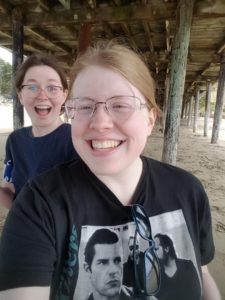 Hi! My name is Emily Jepsen. I’m a graduate student in the University of Utah’s BME program. I am also disabled. There are a few things that my body decided it didn’t want to do properly, but the most impactful one is that I’m visually impaired. I have albinism, a genetic condition that causes my body to not produce and process melanin correctly. This affected my eye development and makes me very nearsighted and photosensitive. Glasses don’t fix everything since my optic nerve and retina didn’t develop properly.
Hi! My name is Emily Jepsen. I’m a graduate student in the University of Utah’s BME program. I am also disabled. There are a few things that my body decided it didn’t want to do properly, but the most impactful one is that I’m visually impaired. I have albinism, a genetic condition that causes my body to not produce and process melanin correctly. This affected my eye development and makes me very nearsighted and photosensitive. Glasses don’t fix everything since my optic nerve and retina didn’t develop properly.
From a classroom standpoint, this usually means that I sit in the very front and I typically need extra time on assignments because my vision makes it difficult for me to quickly find things on a page or screen. From a research lab perspective, I’m still figuring out exactly what accommodations I need. I generally hold things very close to my face so I can see them and have to plan around eye-strain induced migraines. I really enjoy my research lab and classwork experiences so far! It’s difficult, but very rewarding.
If you met me on the street, you would never know that I’m disabled. I hardly ever use a cane, although it’s always in my backpack if I need it. I don’t have a guide dog. However, I still can’t drive and therefore I walk everywhere or take the bus. Before COVID, I determined whether I could go to a social activity by how long the bus ride would take. That’s not as much of a problem this semester, but I still have to plan for a 30-40 minute commute that would only take 5 minutes in a car.
I’d like you to understand that disabled people exist all around you. You usually can’t tell if someone has a disability simply by looking at them. Tasks we struggle with may be something you never considered as difficult or gave any thought to at all. When you’re working with someone who is disabled, ask us what we need! We know our disabilities very well.